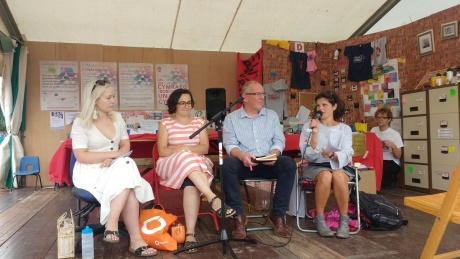Campaigners at the Eisteddfod today (2pm, Thursday, 7th August) will press for a review of Welsh education law to adopt the same system as Catalonia in order to move, over time, to Welsh-medium education for every child.
The call comes as a Board led by the former Assembly Member Aled Roberts reviews the law governing how Welsh-medium education is developed, the Schools Organisation and Standards Act (Wales) 2013. At the moment, there is no long-term goal enshrined in law – instead, local councils are only required to ‘improve planning’ and the ‘standards of Welsh language teaching’. Ministers also have the power to require councils to assess the demand for Welsh-medium education.
The legislation in Catalonia, on the other hand, states that "educational establishments at all levels shall make Catalan the vehicle of normal expression in their educational and administrative activities, both internally and externally." Despite the language being banned under the Franco dictatorship, around 80% of the seven and a half million people living in Catalonia now speak Catalan.
Speaking ahead of the discussion at the Eisteddfod, Toni Schiavone from Cymdeithas yr Iaith commented:
"Wales can’t move to the Catalan policy overnight, but the law that’s under review at the moment could set that as a longer-term goal. Making the Welsh language the normal medium of education is possible within the next few decades. That’s the main way we’re going to make it to the million Welsh speakers, and move on from that – and our Senedd in Cardiff has the power to do that.
"That doesn’t mean that every single teacher or educationalist has to be fluent in Welsh. A third of our teachers are already fluent. Of the rest, there is a substantial proportion with some ability, knowledge and understanding of the language. We’re starting from a strong base, but, of course, there will need to significant improvement in the skills of the workforce over time."
He added:
"Obviously, there will need to be more than just a long-term goal in the new law – there will need to be short and medium-term milestones and clear financial incentives to deliver. And given that these targets will replace the old idea of ‘assessing demand’, there’s also room to question whether local plans are the most effective means of organising the system.
“It's important that everyone understands where our journey as a nation is going, and that making Welsh the norm as the medium of teaching is our goal as a country. That’s key, in order for the Government to meet its own targets. Although it’s not obvious, implicit in the current Government’s own policy is an acceptance that there will be, at some point in the decades to come, a situation where every child will be taught mainly through the medium of Welsh. Our argument is that that implicit commitment should be made explicit in law so that every part of the education system understands and plans to deliver that."
